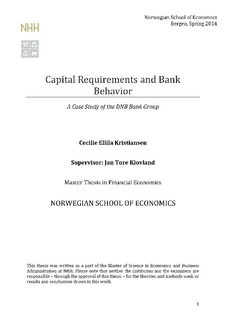Capital requirements and bank behavior : a case study of the DNB Bank Group
Master thesis
Permanent lenke
http://hdl.handle.net/11250/223629Utgivelsesdato
2014Metadata
Vis full innførselSamlinger
- Master Thesis [4378]
Sammendrag
The Basel III Capital Accord was introduced as a regulatory response to the financial
crisis. Lack of sufficient
capital requirements for banks was an important lesson learned
after several financial institutions went bankrupt.
By strengthening the balance sheet of
banks, t
he Basel III Accord
aims to
prevent future crisis
and bank distress.
When banks’ regulatory e
nvironment is changed through increased capital
requirements, they are forced to adapt their behavior.
The object of this
thesis
is to
examine
how Norwegian banks in general and specifically the
DNB
Bank Group,
has
adapted to a situation where its capital
ratios are becoming increasingly constrained by
regulation.
The ultimate aim of the thesis is to study whether the DNB Bank Group is
able to fulfill the new capital requirements being introduced gradually towards 1
July
2016 without issuing equity.
An
ana
lysis of the Norwegian banks’ behavior in the period 2009
-
2013 indicates that
banks have primarily adapted to the increased capital requirements through issuing
equity capital or retaining
earnings. The analysis shows that Norwegian banks are on
the track
to fulfilling the capital requirements set by the Norwegian Ministry of Finance.
In order to conduct an in
-
depth analysis, a case study of the DNB Bank Group was
conducted. The bank has implemented several measures which strengthens the balance
sheet.
Through an analysis of the DNB Bank Group’s financials
,
projected until the
second quarter of 2016, I can conclude that given the assumptions applied in the
baseline case, the bank is able to fulfill the capital requirements
without having to issue
equity.
